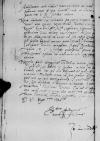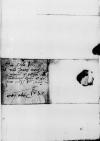Reverendissime in Christo Pater et Domine ac amice mihi tamquam pater colendissime. Salutem et obsequiorum meorum accuratissimam commendationem.
Multorum amicorum meorum cotidianis precibus fatigatus, nuper ad Dominationem Vestram Reverendissimam litteras dederam, quidem in commendationem cuiusdam Diego Gracián de Alderete (*ca. 1494 – †1586), humanist, translator from Greek and Latin into Castilian, became engaged to Dantiscus' daughter Juana on 1537-06-30, and married her in 1538; scribe and secretary to Emperor Charles V, later secretary to King Philip II of Spain (SKOLIMOWSKA 2000; CE, vol. 2, p. 122)⌊Hispani iuvenisDiego Gracián de Alderete (*ca. 1494 – †1586), humanist, translator from Greek and Latin into Castilian, became engaged to Dantiscus' daughter Juana on 1537-06-30, and married her in 1538; scribe and secretary to Emperor Charles V, later secretary to King Philip II of Spain (SKOLIMOWSKA 2000; CE, vol. 2, p. 122)⌋ tum honesti, tum litterati, qui vehementer ambiebat nuptias Juana Dantisca (*1527 – †1601), daughter of Ioannes Dantiscus and Isabel Delgada; wife of Diego Gracián de Alderete (SKOLIMOWSKA 2004, p. 52; LLAMAS 1995; LLAMAS 1999; LLAMAS 2001; LLAMAS, SKOLIMOWSKA; MELGAR, 37, ...)⌊filiaeJuana Dantisca (*1527 – †1601), daughter of Ioannes Dantiscus and Isabel Delgada; wife of Diego Gracián de Alderete (SKOLIMOWSKA 2004, p. 52; LLAMAS 1995; LLAMAS 1999; LLAMAS 2001; LLAMAS, SKOLIMOWSKA; MELGAR, 37, ...)⌋ Dominationis Vestrae, quam in Spain (Hispania)⌊HispaniisSpain (Hispania)⌋ reliquit. Verum dum Dominatio Vestra mihi tardiuscule respondet, intelligo ex amicorum litteris eundem Diego Gracián de Alderete (*ca. 1494 – †1586), humanist, translator from Greek and Latin into Castilian, became engaged to Dantiscus' daughter Juana on 1537-06-30, and married her in 1538; scribe and secretary to Emperor Charles V, later secretary to King Philip II of Spain (SKOLIMOWSKA 2000; CE, vol. 2, p. 122)⌊iuvenemDiego Gracián de Alderete (*ca. 1494 – †1586), humanist, translator from Greek and Latin into Castilian, became engaged to Dantiscus' daughter Juana on 1537-06-30, and married her in 1538; scribe and secretary to Emperor Charles V, later secretary to King Philip II of Spain (SKOLIMOWSKA 2000; CE, vol. 2, p. 122)⌋, qui tum procum agebat, factum esse maritum Juana Dantisca (*1527 – †1601), daughter of Ioannes Dantiscus and Isabel Delgada; wife of Diego Gracián de Alderete (SKOLIMOWSKA 2004, p. 52; LLAMAS 1995; LLAMAS 1999; LLAMAS 2001; LLAMAS, SKOLIMOWSKA; MELGAR, 37, ...)⌊filiaeJuana Dantisca (*1527 – †1601), daughter of Ioannes Dantiscus and Isabel Delgada; wife of Diego Gracián de Alderete (SKOLIMOWSKA 2004, p. 52; LLAMAS 1995; LLAMAS 1999; LLAMAS 2001; LLAMAS, SKOLIMOWSKA; MELGAR, 37, ...)⌋ Dominationis Vestrae Reverendissimae matrimoniumque utrimque consumatum transactumque esse, quod Deus bene fortunet. Proinde cum ita res ceciderit, Dominationem Vestram studiose hortor, velit meminisse se esse patrem Juana Dantisca (*1527 – †1601), daughter of Ioannes Dantiscus and Isabel Delgada; wife of Diego Gracián de Alderete (SKOLIMOWSKA 2004, p. 52; LLAMAS 1995; LLAMAS 1999; LLAMAS 2001; LLAMAS, SKOLIMOWSKA; MELGAR, 37, ...)⌊puellaeJuana Dantisca (*1527 – †1601), daughter of Ioannes Dantiscus and Isabel Delgada; wife of Diego Gracián de Alderete (SKOLIMOWSKA 2004, p. 52; LLAMAS 1995; LLAMAS 1999; LLAMAS 2001; LLAMAS, SKOLIMOWSKA; MELGAR, 37, ...)⌋ et praefatum Diego Gracián de Alderete (*ca. 1494 – †1586), humanist, translator from Greek and Latin into Castilian, became engaged to Dantiscus' daughter Juana on 1537-06-30, and married her in 1538; scribe and secretary to Emperor Charles V, later secretary to King Philip II of Spain (SKOLIMOWSKA 2000; CE, vol. 2, p. 122)⌊iuvenemDiego Gracián de Alderete (*ca. 1494 – †1586), humanist, translator from Greek and Latin into Castilian, became engaged to Dantiscus' daughter Juana on 1537-06-30, and married her in 1538; scribe and secretary to Emperor Charles V, later secretary to King Philip II of Spain (SKOLIMOWSKA 2000; CE, vol. 2, p. 122)⌋, quem mihi amici ab eruditione et modestia certatim commendant, non gravetur promovere. Accepi his diebus aliquot litteras Dominationis Vestrae Reverendissimae inscriptas, quas complusculos dies apud me remoratus sum eo, quod non haberem ullam mittendi commoditatem. Nam hoc in loco nullus est usus postarum et raro hinc istuc commeatur. Nunc vero nactus opportunitatem cuiusdam nuntii Vratislaviensis eas ad Dominationem Vestram transmitto ex quibus, ni fallor, plenius intelliget negotium Juana Dantisca (*1527 – †1601), daughter of Ioannes Dantiscus and Isabel Delgada; wife of Diego Gracián de Alderete (SKOLIMOWSKA 2004, p. 52; LLAMAS 1995; LLAMAS 1999; LLAMAS 2001; LLAMAS, SKOLIMOWSKA; MELGAR, 37, ...)⌊filiaeJuana Dantisca (*1527 – †1601), daughter of Ioannes Dantiscus and Isabel Delgada; wife of Diego Gracián de Alderete (SKOLIMOWSKA 2004, p. 52; LLAMAS 1995; LLAMAS 1999; LLAMAS 2001; LLAMAS, SKOLIMOWSKA; MELGAR, 37, ...)⌋ suae. Nam sunt et inter illas litterae ipsius Diego Gracián de Alderete (*ca. 1494 – †1586), humanist, translator from Greek and Latin into Castilian, became engaged to Dantiscus' daughter Juana on 1537-06-30, and married her in 1538; scribe and secretary to Emperor Charles V, later secretary to King Philip II of Spain (SKOLIMOWSKA 2000; CE, vol. 2, p. 122)⌊adolescentisDiego Gracián de Alderete (*ca. 1494 – †1586), humanist, translator from Greek and Latin into Castilian, became engaged to Dantiscus' daughter Juana on 1537-06-30, and married her in 1538; scribe and secretary to Emperor Charles V, later secretary to King Philip II of Spain (SKOLIMOWSKA 2000; CE, vol. 2, p. 122)⌋, qui, quantum intelligo, nescio quid rei non magni momenti a Dominatione Vestra flagitat. Quamobrem eandem affectuosissime rogo et obtestor, ut tum propter nomen Juana Dantisca (*1527 – †1601), daughter of Ioannes Dantiscus and Isabel Delgada; wife of Diego Gracián de Alderete (SKOLIMOWSKA 2004, p. 52; LLAMAS 1995; LLAMAS 1999; LLAMAS 2001; LLAMAS, SKOLIMOWSKA; MELGAR, 37, ...)⌊filiaeJuana Dantisca (*1527 – †1601), daughter of Ioannes Dantiscus and Isabel Delgada; wife of Diego Gracián de Alderete (SKOLIMOWSKA 2004, p. 52; LLAMAS 1995; LLAMAS 1999; LLAMAS 2001; LLAMAS, SKOLIMOWSKA; MELGAR, 37, ...)⌋, cuius ille iam maritus effectus est, tum in gratiam et intuitum meum praefatum
 BK, 230, p. 16
adolescentem velit habere commendatissimum ad quod paternus amor et ipsa honesti ratio ac amicorum preces Dominationem Vestram Reverendissimam flecteri debent.
BK, 230, p. 16
adolescentem velit habere commendatissimum ad quod paternus amor et ipsa honesti ratio ac amicorum preces Dominationem Vestram Reverendissimam flecteri debent.
Nova habentur ex Sclavonia pro horum temporum condi hidden by binding⌈[ndi]ndi hidden by binding⌉cione satis grata. Nam dominus Hans Katzianer (*1490 – †1539)⌊Ioannes Catzianer hidden by binding⌈[ner]ner hidden by binding⌉Hans Katzianer (*1490 – †1539)⌋ Ferdinand I of Habsburg (*1503 – †1564), from 1521 Archduke of Austria, from 1526 King of Bohemia and Hungary, Croatia and Slavonia as Ferdinand I, 1531-1558 King of the Romans, 1558-1564 Holy Roman Emperor; son of Philip I the Handsome and Joanna the Mad of Castile, a younger brother of Charles V of Habsburg⌊regiae Romanorum etc. maiestatisFerdinand I of Habsburg (*1503 – †1564), from 1521 Archduke of Austria, from 1526 King of Bohemia and Hungary, Croatia and Slavonia as Ferdinand I, 1531-1558 King of the Romans, 1558-1564 Holy Roman Emperor; son of Philip I the Handsome and Joanna the Mad of Castile, a younger brother of Charles V of Habsburg⌋ capitaneus supremus habet hidden by binding⌈[abet]abet hidden by binding⌉ exercitum XX milium exercitatorum militum quem hidden by binding⌈[em]em hidden by binding⌉ basan Albaegraeciae non audet cum suis copiis exspectare hidden by binding⌈[ctare]ctare hidden by binding⌉, sed pedem referre conatur, quem dominus Hans Katzianer (*1490 – †1539)⌊Ioannes CatzianerHans Katzianer (*1490 – †1539)⌋ acriter insequitur. Si quid successerit litteris hidden by binding⌈[litteris]litteris hidden by binding⌉ dignum, Dominationi Vestrae significabo, quamprimum potero, quamvis hidden by binding⌈[amvis]amvis hidden by binding⌉ tabellariorum operam non habeamus hic usque quaque obviam.
Negotia pacis Hungaricae ita adhuc incerta sunt, ut hidden by binding⌈[ut]ut hidden by binding⌉, quid de illis ad Dominationem Vestram scribam, nescius sim, nam hidden by binding⌈[m]m hidden by binding⌉ John Zápolya (János Szapolyai) (*1487 – †1540), 1526-1540 King of Hungary; son of István Szapolyai and Jadwiga of Cieszyn in 1540 married Isabella, dauther of of King Sigismund Jagiellon of Poland. He fought against Ferdinand of Habsburg for the right to the title of King of Hungary⌊vaivodaJohn Zápolya (János Szapolyai) (*1487 – †1540), 1526-1540 King of Hungary; son of István Szapolyai and Jadwiga of Cieszyn in 1540 married Isabella, dauther of of King Sigismund Jagiellon of Poland. He fought against Ferdinand of Habsburg for the right to the title of King of Hungary⌋ oratores suos, qui hic aderant, re indecisa Vaciam hidden by binding⌈[aciam]aciam hidden by binding⌉ revocavit. Tractatus tamen non sunt penitus dirupti, quod vero ex ipsis contigerit Dominationem Vestram ante meum ex hoc, loco discessum diligenter admonebo.
Quam Dominus Deus diutissime sospitet. Cui me et offi(cia) mea tamquam domino et amico meo colendissimo commendo.
 BK, 230, p. 16
adolescentem velit habere commendatissimum ad quod paternus amor et ipsa honesti ratio ac amicorum preces Dominationem Vestram Reverendissimam flecteri debent.
BK, 230, p. 16
adolescentem velit habere commendatissimum ad quod paternus amor et ipsa honesti ratio ac amicorum preces Dominationem Vestram Reverendissimam flecteri debent.


